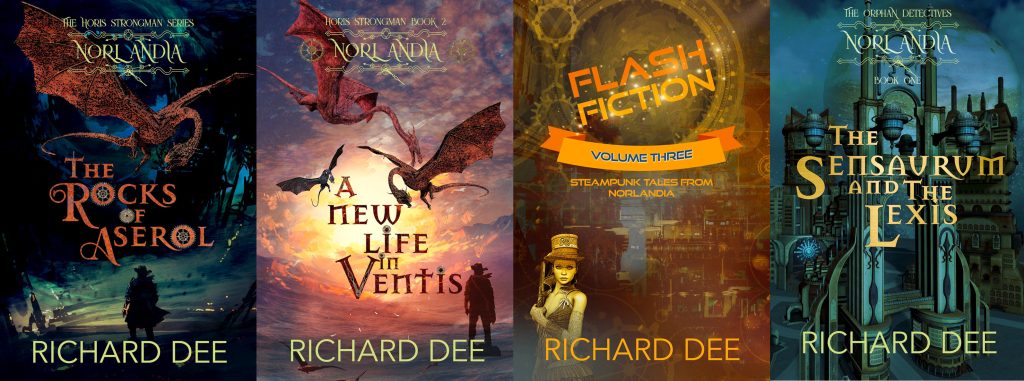Steampunk is a particularly hard sell.
I love writing it but I don’t think I know many people who actually read it.
I’ve written three novels and one book of short stories (which is really a set of essays, giving more detail about the backstory of the world) set in the place I call Norlandia. And I have two novels and another short story in progress.

Although the stories are science fiction, they could almost be a history of the future of the Victorian age.
Norlandia is a place not unlike Europe in around 1870, except for one major thing.
There is no oil and only a rudimentary idea of the power of electricity.
This is not to say that the population of Norlandia, or at least the scientifically educated ones, are unaware of it. They actually refer to it as “statics” and consider it no more than a novelty, a fascinating effect but incapable of doing the work of steam or clockwork powered machinery.
But this does not mean that they are technologically backward. Even without these two sources of power, science and innovation have not stood still. Norlandia has all the benefits of a modern society. As well as steam railways, ships and steam vehicles there are jet-propelled aircraft, hydraulically powered robots, computers and so much more.
The capital, Metropol City, has a fully automatic monorail linking all parts of the city and a continuous display of exciting new inventions at the Palais of Curiosities.
There are also Dragons in the land, and a way of communicating with them. It turns out that they have a large part to play in the story of this world.
As our Victorian ancestors knew, it really is quite amazing what you can achieve with a little ingenuity and science.
Take a look at this tale from Norlandia,
The Rail-Ryde.
Aristote Graves was the driver of the Rail-Ryde to Aserol. Sat in his cab atop the tonnes of locomotive and coal he regarded the twin metal rails ahead of him. His seat vibrated slightly as the pressure was released from the boiler below and behind his position. He could imagine his engineer checking the pressures and the belt that fed powdered coal into the furnace to heat the water that gave them motion.
The enclosed cabin was a boon as well, with its padded seat it was so much better than the standing position of the first Rail-Rydes that he had worked on. His father had been a track engineer and was responsible for surveying and building the route that they were about to take, so from an early age, Aristote had been a Rail man.
He looked at his timepiece; it showed twenty minutes before the Ryde’s departure. It was time to make his final inspection.
He opened the door on the side of the engine and descended a short ladder to the platform. The terminus was huge and vaulted with a glass roof held in place by a metal lattice. Birds flocked under its protection, roosting in the frame. A group of small boys were admiring the engine and he waved them out of his way. But not unkindly, he had been one of them.
Looking under the engine he could see no leakage of oils or water, save a small steam cloud from one of the drive pistons. That was nothing, as the seal warmed up it would expand. Reaching the coal wagon he climbed up its side, lifted a corner of the canvas cover and peered in. The space was filled with powdered coal, enough to see him to Aserol. Dropping to the platform he walked to the Bovine Shredder at the engine’s front. A wickedly sharp metal scoop, it was designed to clear fallen trees and other obstacles from the line. It was polished and secure. Aristote grunted, at the speeds he would be travelling he would have to rely on it; the brakes alone would never stop the Ryde for any obstacle.
He knew that brigands tried to stop Rydes to rob the passengers. They would place all sorts of things on the line. The carriages behind him had a sting though; there were soldiers with powerful gas guns in a recessed walkway atop each one. Commanding the high ground they were effective against anyone attacking the Ryde.
Dropping to the roadbed he checked the outside of the engine and then returned to the cabin. Lucas Meadows, his engineer, was sitting in the opposite seat to his, dressed in overalls with a greasy rag hanging from one pocket.
“Everything alright, Ari?” he asked and Aristote nodded, he disliked the abbreviation but everyone used it.
“Is all your gear in order, Lucas?” he inquired.
“Oh yes, the coal feed is good, we have water till the first pickup and she’s running sound.”
“Up pressure then, and engage the drive.” The shuddering increased as Lucas threw switches; the Ryde anticipated motion
Aristote opened his quarter light and peered out, back along the length of the Ryde. He saw the Ryde-Guardian wave a green flag, just as the station clock started to chime.
Without looking he released the brakes and heard them hiss. Then he moved the power control to the first position. With a wheeze and a jolt, the steam from the boiler flowed to the pistons, two on each side. The pistons moved cranks which turned the wheels. The engine moved off, picking up the slack in the couplings. The pistons made a regular hiss-clunk, all four in order. The carriages started to move. Smoke poured from the chimney. As Aristote moved the lever through each position the speed increased. The engine wobbled as points were crossed.
They burst out from under the glass roof, the sunlight dazzling. In front of them, the city laid spread out in all its glory. There were factory and steam local chimneys belching smoke. Equine- and steam-powered vehicles of all sorts moved under the arched brick viaduct that the rails were laid on. Tall buildings housed the workings of the nation. In the distance the sea glistened. The wheels clicked over the ties between the lengths of the steel rails.
Lucas was intent on his gauges, “Everything is good, Ari,” he confirmed. “I’ll get us some char.”
Aristote increased speed to maximum and the sounds from the pistons merged into one continuous roar. A brew would be nice, he thought.
Ahead the rails pointed south, arrow straight to Aserol and all points between.

What do you think?
I’d love to get your comments, please leave them below. While you’re here, why not take a look around? There are some freebies and lots more content, about me, my writing and everything else that I do. You can join my newsletter for a free novella and more news by clicking this link.

![]()



sally cronin
Great explanations Richard and demonstration of the genre in action..
Richard Dee
Thanks, Sally. 🙂
Michael
Its a very interesting genre, and i hope to read more of it, after i had finished some others on my shelves. Thanks, Richard! Great work, and for me also with the positive side effect to learn new vocables. 😉 xx Michael
Richard Dee
Thanks for commenting, there are some wonderfully inventive Steampunk stories out there.
Colleen A Parkinson
Try posting this on some of the Facebook groups that feature fantasy as well as sci-fi books, if you haven’t already. I think it might provoke some discussion as well as attention to your work.
Richard Dee
That’s a very sensible idea, I do what I can but a lot of groups seem to frown on self-promotion.